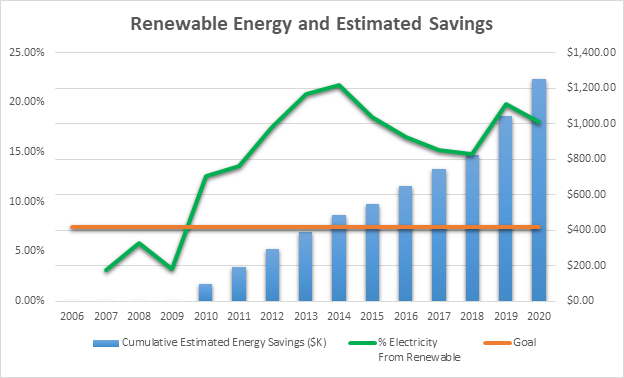
Energy and Water Management
Kennedy Space Center’s Energy and Water Program’s vision is to secure America’s future in space with an energy and water efficient and resilient multi-user spaceport.
Energy and Water Program goals, established in NPR 8570.1, NASA Energy Management Program, are to reduce energy and water risk to mission through life-cycle cost-effective compliance with federal law, executive orders and NASA policies. This is accomplished through energy and water efficiency and conservation methods along with an increased use of renewable energy sources.
Plans for Meeting or Exceeding Goals
KSC utilizes the Department of Energy (DOE) 50001 Ready program to implement an ISO 50001-based energy management systems for continuous improvement of energy and water performance. Benefits of using DOE 50001 include; transferrable and consistent energy culture that persists through personnel changes; data-driven actions to improve performance and sustain energy and financial savings; and a system tailored to site-specific regulatory compliance work and energy goals to streamline reporting. DOE 50001 is a framework to document key policies and procedures and leadership, plan objectives and targets, develop action plans, establish operational controls, monitor performance, implement corrective actions, and increase awareness and communication. More on DOE 50001 can be found here.
Kennedy’s 2020 Energy, Renewable and Water Conservation Metrics
Recent Initiatives
Resiliency Assessment
Using a qualitative and quantitative approach as a guide, the National Renewable Energy Laboratory (NREL) staff is working with KSC key stakeholders to review current KSC resilience related documents, procedures, and plans and identify additional site-specific risk impacts and resilience options. The resilience planning effort will integrate considerations from a number of risk categories into existing planning and preparedness activities and develop a range of options for managing the associated risks with the aim of enabling KSC mission operations to adapt to, withstand, or rebound from hazard occurrences. Vulnerabilities will be assessed related to the energy, water, communications, and transportation sectors, and will focus on both organizational/process type vulnerabilities and infrastructure/technological vulnerabilities.
UESC Phase 1
The Utility Energy Services Contract (UESC), Phase 1 Feasibility Study completed and the Design/Implementation task order was successfully awarded to Florida Power and Light. The project includes $18.6 million of energy conservation measures, upgrades, modifications and consolidations of various energy consuming systems at KSC, addition of new solar energy generation capacity and added resiliency, and increased system controls, which will yield $1.4 million in energy and maintenance cost savings per year with a payback within 15 years.


